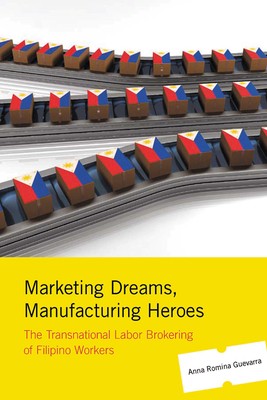
- We will send in 10–14 business days.
- Author: Anna Romina Guevarra
- Publisher: Rutgers University Press
- ISBN-10: 0813546338
- ISBN-13: 9780813546339
- Format: 15.2 x 22.9 x 1.9 cm, hardcover
- Language: English
- SAVE -10% with code: EXTRA
Reviews
Description
In a globalized economy that is heavily sustained by the labor of immigrants, why are certain nations defined as "ideal" labor resources and why do certain groups dominate a particular labor force? The Philippines has emerged as a lucrative source of labor for countries around the world. In Marketing Dreams, Manufacturing Heroes Anna Romina Guevarra focuses on the Philippines--which views itself as the "home of the great Filipino worker"--and the multilevel brokering process that manages and sends workers worldwide. She unravels the transnational production of Filipinos as ideal migrant workers by the state and explores how race, color, class, and gender operate.
The experience of Filipino nurses and domestic workers--two of the country's prized exports--is at the core of the research, which utilizes interviews with employees at labor brokering agencies, state officials from governmental organizations in the Philippines, and nurses working in the United States. Guevarra's multisited ethnography reveals the disciplinary power that state and employment agencies exercise over care workers--managing migration and garnering wages--to govern social conduct, and brings this isolated yet widespread social problem to life.
EXTRA 10 % discount with code: EXTRA
The promotion ends in 17d.09:59:53
The discount code is valid when purchasing from 10 €. Discounts do not stack.
- Author: Anna Romina Guevarra
- Publisher: Rutgers University Press
- ISBN-10: 0813546338
- ISBN-13: 9780813546339
- Format: 15.2 x 22.9 x 1.9 cm, hardcover
- Language: English English
In a globalized economy that is heavily sustained by the labor of immigrants, why are certain nations defined as "ideal" labor resources and why do certain groups dominate a particular labor force? The Philippines has emerged as a lucrative source of labor for countries around the world. In Marketing Dreams, Manufacturing Heroes Anna Romina Guevarra focuses on the Philippines--which views itself as the "home of the great Filipino worker"--and the multilevel brokering process that manages and sends workers worldwide. She unravels the transnational production of Filipinos as ideal migrant workers by the state and explores how race, color, class, and gender operate.
The experience of Filipino nurses and domestic workers--two of the country's prized exports--is at the core of the research, which utilizes interviews with employees at labor brokering agencies, state officials from governmental organizations in the Philippines, and nurses working in the United States. Guevarra's multisited ethnography reveals the disciplinary power that state and employment agencies exercise over care workers--managing migration and garnering wages--to govern social conduct, and brings this isolated yet widespread social problem to life.


Reviews